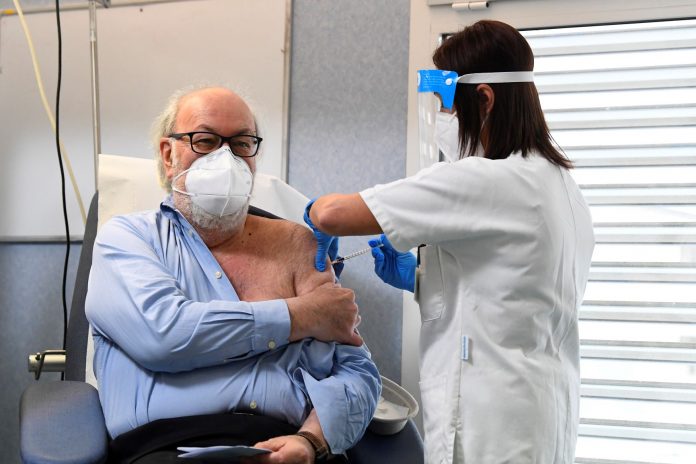Europe’s massive COVID-19 vaccination drive has begun as the United States revealed December was the nation’s deadliest month with more than 63,000 Americans lost to the virus in the past 26 days.
In comparison, the entire month of November saw about 36,964 deaths. The grim death toll came on the heels of several brutal months for the US, with COVID-19 ravaging communities from coast to coast, crippling hospital systems and prompting new widespread restrictions.
The authorisation of two COVID-19 vaccines earlier in December offered some hope of a light at the end of the tunnel.
In Europe, a fightback has begun with French President Emmanuel Macron declaring: “We have a new weapon against the virus.”
Europe has launched a mass COVID-19 vaccination drive with pensioners and medics lining up for the first shots to see off a pandemic that has crippled economies and claimed more than 1.7 million lives worldwide.
“Thank God,” 96-year-old Araceli Hidalgo said as she became the first person in Spain to have a vaccine at her care home in Guadalajara, near the capital Madrid.
“Let’s see if we can make this virus go away.”
In Italy, the first country in Europe to record significant numbers of infections, 29-year-old nurse Claudia Alivernini was one of three medical staff at the head of the queue for the shot developed by Pfizer and BioNTech.
“It is the beginning of the end … it was an exciting, historic moment,” she said at Rome’s Spallanzani hospital.
The region of 450 million is trying to catch up with the United States and Britain, who have already started vaccinations using the Pfizer shot.
The European Union is due to receive 12.5 million doses by the end of the year, enough to vaccinate 6.25 million people based on the two-dose regimen.
The companies are scrambling to meet global demand and aim to make 1.3 billion shots next year.
The bloc has secured contracts with a range of drugmakers besides Pfizer, including Moderna and AstraZeneca, for a total of more than two billion vaccine doses and has set a goal for all adults to be inoculated during 2021.
With surveys pointing to high levels of hesitancy towards the vaccine in countries from France to Poland, leaders of the 27-country European Union are promoting it as the best chance of getting back to something like normal life next year.
“We have a new weapon against the virus: the vaccine. We must stand firm, once more,” tweeted French President Emmanuel Macron, who tested positive for the coronavirus this month and left quarantine on Christmas Eve.
“Completely painless,” Greek Prime Minister Kyriakos said after getting his vaccination in a hospital in Athens.
The distribution of the shot presents tough challenges as the vaccine uses new mRNA technology and must be stored at ultra-low temperatures of about -70 degrees Celsius (-112°F).
In Germany, the campaign faced delays in several cities after a temperature tracker showed that about 1,000 shots may not have been kept cold enough during transit.
The Pfizer shots being used in Europe were shipped from its factory in Puurs, Belgium, in specially designed containers filled with dry ice.
They can be stored for up to six months at Antarctic winter temperatures, or for five days at 2C to 8C, a type of refrigeration commonly available at hospitals.
The vaccination drive is all the more urgent because of the concern around new variants of the virus linked to a rapid expansion of cases in Britain and South Africa.





